Borscht, also spelled borsch, borsht, or bortsch, is a beet soup of the Slavic countries. Although borscht is important in Russian and Polish cuisines, Ukraine is frequently cited as its place of origin.
Beetroots (Beta Vulgaris) in Greek Pantzaria or Kokkinogoulia, also known as zacharoteutla, are known in Greece since antiquity as a valuable and nutricious vegetable. Wild Sea Beets (Beta Maritima), being native to the shores of the Mediterranean region, has been used as a vegetable for over 2000 years. There are mentions even by early Greeks and Romans and is the ancestor of cultivated beets, sugar beets and Swiss Chard.
In Greek mythology, beetroots were considered so valuable that they were offered to God Apollo, at Delphi, as a gesture of loyalty and gratitude. The Oracle at Delphi claimed that beetroots were worth their weight in silver, second only to horseradish in mystic potency. Aphrodite the Goddess of Love, would eat a lot of beetroots in order to stay beautiful and sexy. Its colour and shape connects it with the heart and used to be a symbol of love but also as an aphrodisiac. It is said that if a couple eat out from the same beetroot, they will fall in love.
The Greek doctor Hippocrates (460-377 BC), often called “the Father of Medicine,” advocated the use of beet leaves as bindings for wounds. It was also a cure for headaches as well as toothaches and other ailments. Dioscourides and Galenus, two other ancient Greek physicians, believed that beets had properties to produce blood and cure anaemia, something which has been proved in recent years, as the beetroot is rich in iron.
Fresh beetroots image
Containing the powerful antioxidant betacyanin, which gives beetroot its deep red hue, this vegetable purifies the blood and has anti-carcinogenic properties. Research shows it boosts the body’s natural defenses in the liver, regenerating immune cells.
Although beetroot was one of the vegetables where in some sites I read that it was good for gallbladder problems, I also read some contradictory opinions. However, most of them were in favour, so my mind was made up to use them. I can assure you that my husband did not have any problems after eating them.
I quote some of the medicinal properties of beetroots from an article by Eve Juurik, The Spring of Life: “Beets contain an abundance of minerals: potassium, phosphorus, calcium, sulphur, iodine, iron, manganese, chlorine, and copper, as well as traces of the rare metals rubidium and caesium; vitamins B1, B2, niacin, B6, B12, C, P, and beta carotene; flavonoids; natural sugar, and a good quality and quantity of amino acids.
The part of the beet used medicinally is the root. Beetroot contains anti-tumor, emollient, nutritive, rejuvenative, stimulating, resistance-enhancing properties. Beetroot helps normalize the ph balance of the body and build the blood. It also increases the uptake of oxygen by as much as 400 percent. Beetroot has been used as a supportive therapy in diseases of the liver and fatty liver. It supports and stimulates the liver, gallbladder, kidney, and spleen and increases the flow of bile. Beets have been used successfully in conditions of acne, anemia, cancer, diverticulitis, dysmenorrhea, hepatitis, jaundice, nausea, hypoglycemia, leukemia, poor circulation, diarrhea, constipation, hemorrhoids, and dysentery. Beetroot helps combat acidosis and aids the natural process of elimination and detoxification. The beet juice, being an excellent solvent for inorganic calcium deposits, is valuable in the treatment of hypertension, arteriosclerosis, heart trouble, and varicose veins. Read more here.”
I love beets and have been eating them all my life. One of the soups I’ve been wanting to make for years is Borscht. Now was a good opportunity to try this amazing Russian soup. I’ve read a few recipes and most of them contained beef and butter which of course I did not include in the soup because of my husband’s gallbladder problem. I found a Vegetarian Borscht on which I based my recipe. If you like beets, i think it was great and would highly recommend it. I call it a Vegan Borscht because the yoghurt I used is optional and you can always substitute with a vegan sour cream.
How to make Borscht Soup
Cut the onion and garlic and set aside.
Cut parsley and dill and set aside.
Fill a large bowl with water and lemon juice.
Wash and cut all the vegetables in smaller pieces. Leave the potatoes and celeriac last.
Heat the olive oil in a large soup pot and sauté the onion and garlic until translucent. Add all the vegetables as well as bay leaf and bring to a boil.
Season with salt and pepper and lower heat.
Cover and simmer until the vegetables are soft, about 2 hours. If needed add more water. Remove the bay leaf after the first fifteen minutes.
When cooked, add parsley and dill and cook for 5 more minutes.
Serve hot or cold with additional grated black pepper, a swirl of yoghurt or vegan sour cream, a splash of extra virgin olive oil and some fresh dill and parsley.
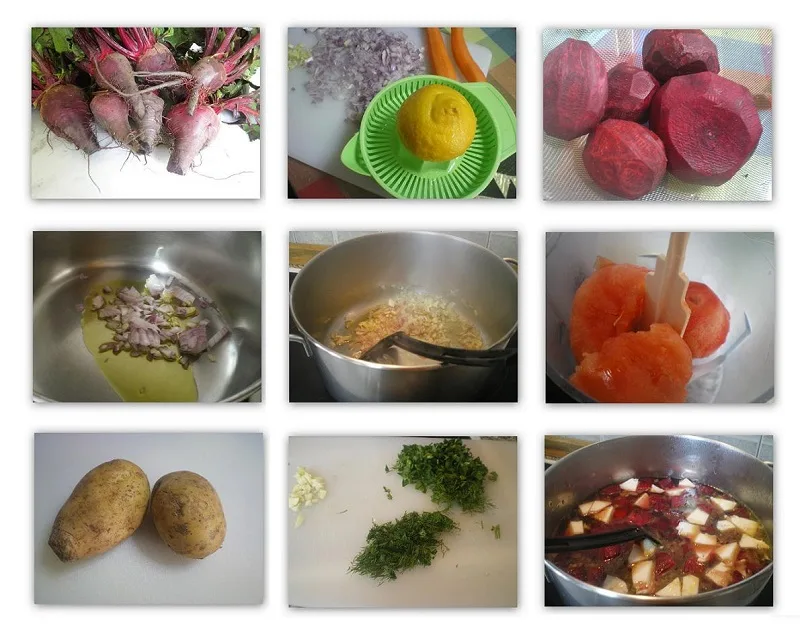
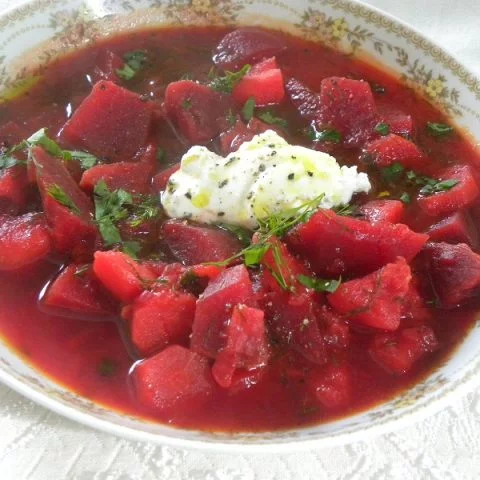
Vegan Borscht Soup
Borscht, also spelled borsch, borsht, or bortsch, is a beet soup of the Slavic countries. Although borscht is important in Russian and Polish cuisines, Ukraine is frequently cited as its place of origin.
Ingredients
- 5 beets (about 600 grams), finely chopped
- 2 carrots, finely chopped
- 1 medium onion, finely chopped
- 1 clove garlic, finely chopped
- 2 tbsp olive oil
- 6 cups water
- 1 large bay leaf
- 250 grams celeriac, finely chopped
- 2 medium potatoes, cubed
- 2 tomatoes, peeled and grated
- 2 tbsp parsley, finely chopped
- 1 tbsp dill, finely chopped
- 2 tbsp lemon juice
- Salt and a little freshly ground black pepper
- Low fat Greek yoghurt or vegan sour cream (optional)
Instructions
- Cut the onion and garlic and set aside.
- Cut parsley and dill and set aside.
- Fill a large bowl with water and lemon juice Wash and cut all the vegetables in smaller pieces Leave the potatoes and celeriac last.
- Heat the olive oil in a large soup pot and sauté the onion and garlic until translucent. Add all the vegetables as well as bay leaf and bring to a boil. Season with salt and pepper and lower heat
- Cover and simmer until the vegetables are soft, about 2 hours. If needed add more water. Remove the bay leaf after the first fifteen minutes.
- When cooked, add parsley and dill and cook for 5 more minutes.
- Serve hot or cold with additional grated black pepper, a swirl of yoghurt or vegan sour cream, a splash of extra virgin olive oil and some fresh dill and parsley
Notes
For those with gallbladder problems avoid adding extra black pepper, yoghurt, sour cream or olive olive oil on top.
Disclaimer: I’m not a doctor, I’m not a surgeon and I’m not a dietician. Each person may have different symptoms, so please consult your doctor before following this diet.
Recipes adapted for Gallbadder Diet:
Makaronia me Kima (spaghetti with Meat Sauce)
Milokopi (Bearded Umbrine) with Roasted Vegetables
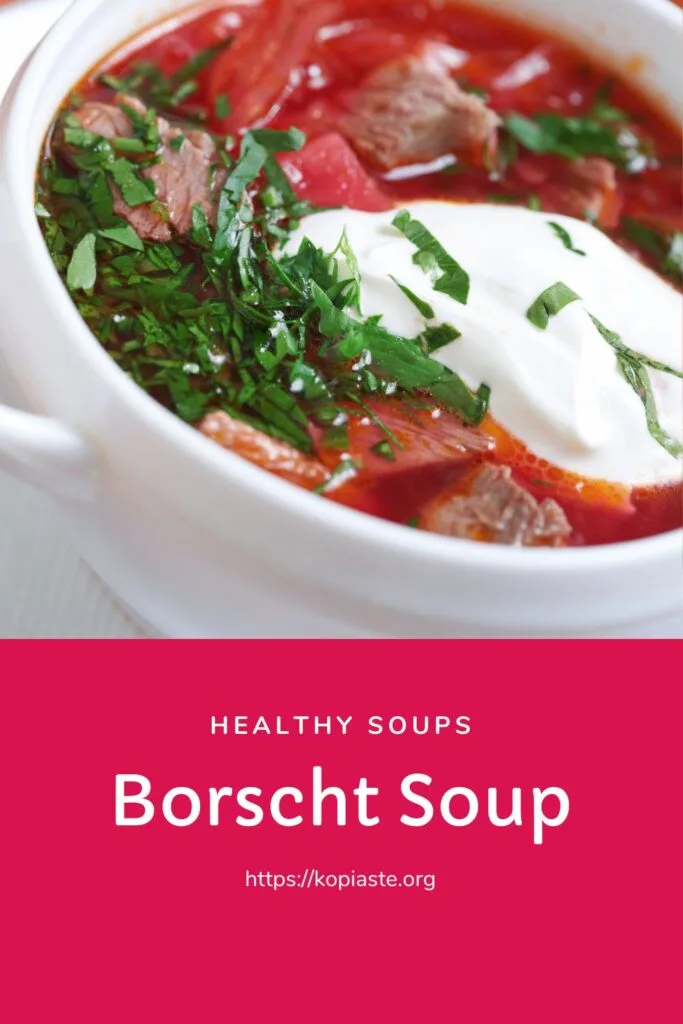
Kopiaste and Kali Orexi,

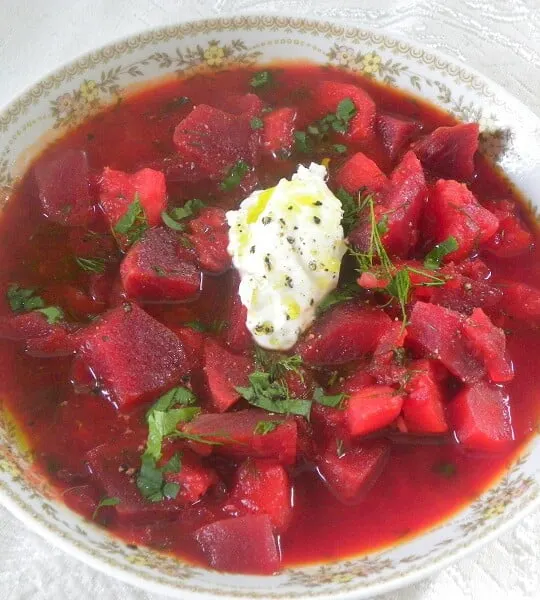
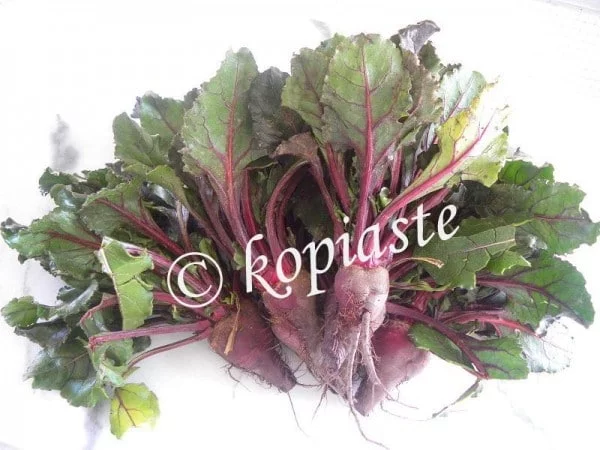
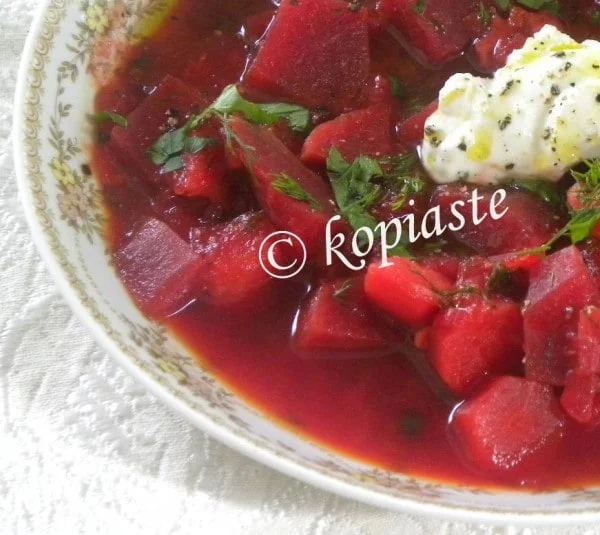
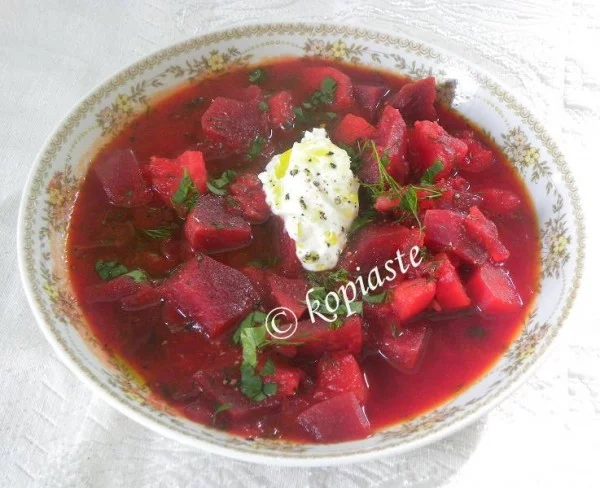

Will
Monday 15th of May 2017
This soup look goes delicious and healthy. I must try it. Thanks for sharing an excellent article.
Bella Swan
Wednesday 27th of May 2015
Hey there…Thank you so much for sharing this post. I love to drink this soup of beet but I was not aware how to make this and now I can make it easily. The steps you have mention in this post is pretty easy and now it is crystal clear to me. I hope you will more recipe like this. Beet is rich in nutrients.
Andrew
Saturday 16th of November 2013
Hello, This soup looks pretty tasty. Even though I am not a vegan, I will be sure to try this out. Thank you for sharing this, Andrew
ace maxs
Thursday 10th of January 2013
Loved your adaptation here and when it's so healthy, you can't beet it! (groan…)
John Ransom
Tuesday 6th of November 2012
wow! this was excellent. I woke up with a random craving for and this really hit the spot! it's also one of the most aesthetically pleasing dishes I've ever cooked, so many deep colors.